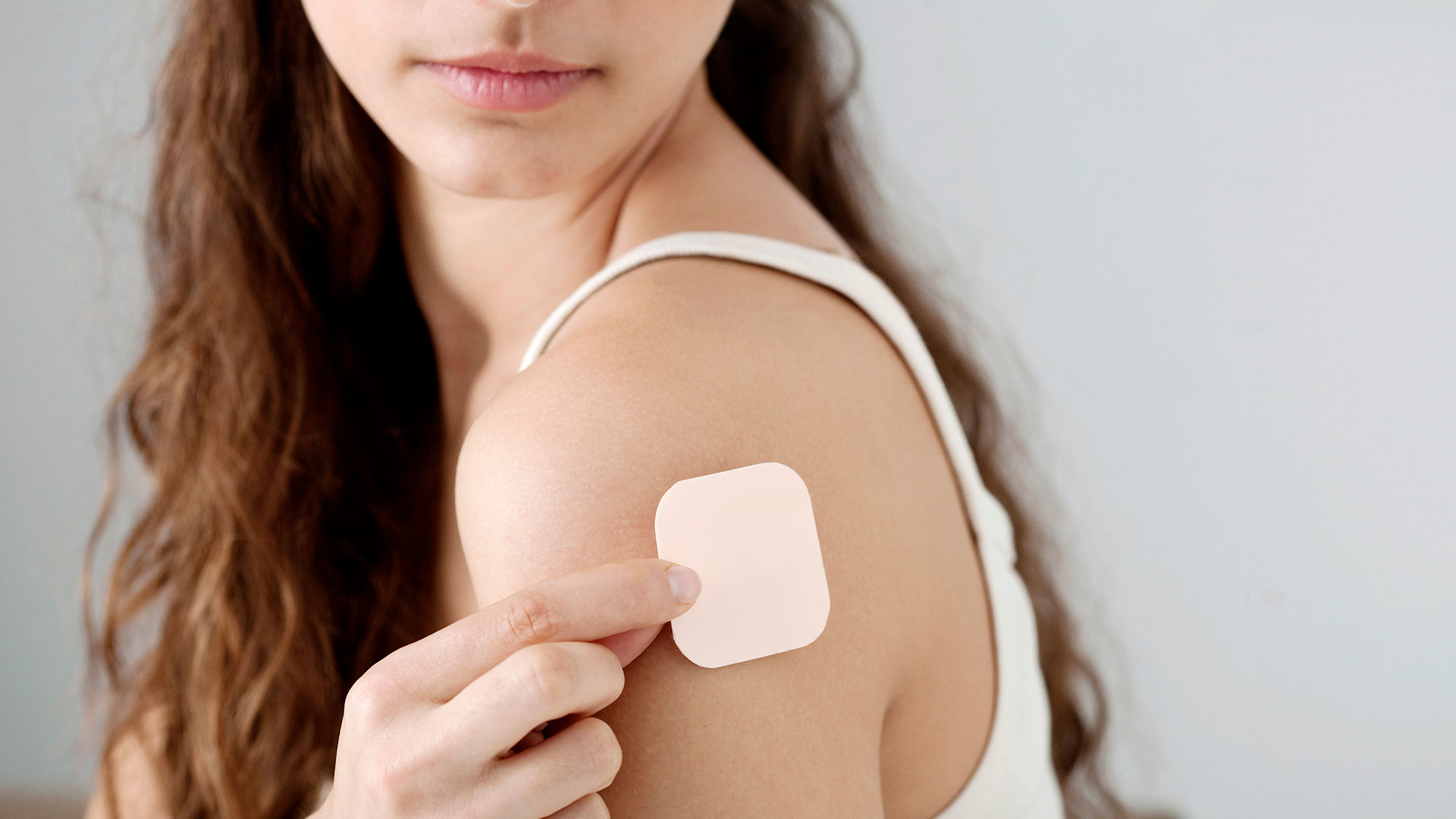Do vitamin patches work? Here’s the science on transdermal vitamins
Do vitamin patches work, and could they be the answer when it comes to getting all the nutrients we need?


Do vitamin patches work, and should we all be using them to get healthier? Over the last few years, vitamin patches have garnered lots of attention, whether people are looking for a ‘quick fix’ without having to diet to get everything they need, or it’s already health-conscious people looking for a nutritional top-up they don’t have to swallow. However, there’s plenty of hearsay and pseudoscience around vitamin patches – which we’re here to clear up.
Vitamin patches, or vitamin skin patches, are designed to replace oral supplements such as the vitamin D spray, which tops our list of the best vitamins for women over 50. The premise is simple: you apply a square of adhesive material loaded with nutrients onto your skin, which then absorbs the nutrients from the patch.
This is called a transdermal method of delivery, and it’s nothing new: in fact, it’s similar to a nicotine patch, which smokers use to relieve themselves of cravings while they’re trying to quit. But although there’s a firm base for this technology in the smoking world, how much evidence is there from a nutritional standpoint? When asking yourself “do vitamin patches work?” the answer is harder to figure out than it first appears.
Google ‘wellness supplements’ and you’ll get a staggering 300m+ results, covering everything from quick-fix solutions, dietary aids, fitness formulas, and celebrity-endorsed products to the latest wellness trends to hit the market. Gone are the days when a tablet was the only way to get your vitamin fix.
If you aren’t a fan of swallowing pills and don’t like needles, then patches could appear to be a good alternative. Read on to discover all about this trend that is appearing in health stores around the world and online. Should we rely on this method to get our daily quota of vitamins, or are they simply too good to be true?
An expert on vitamins and supplements, Kathryn Danzey is the founder of Rejuvenated, the health supplements company best known for launching the multi-award-winning Collagen Shots drink.
What are vitamin patches and how do they work?
These adhesive patches claim to deliver vitamins into the bloodstream through skin pores, using nanotechnology.
Get the Fit&Well Newsletter
Start your week with achievable workout ideas, health tips and wellbeing advice in your inbox.
Different brands recommend different patch wear durations, but generally they can be worn for eight hours, through the day or night.
Founder of Rejuvenated supplements Kathryn Danzey said: ‘To maximize the effectiveness of vitamin patches it’s important to remember not to apply a body lotion to the area where you are going to fix the patch, and to ensure they are stuck to clean skin,’ she advises.
Who are vitamin skin patches for?
If you have a specific health concern or a goal you want to achieve, there is a patch out there targeted to help you. There is a cocktail of supplement patches available, from multivitamin patches to patches that improve overall health. Then there are other that target specific concerns, including those that claim to boost energy levels, combat hangovers, relieve swollen joints and inflammation, tackle acne, support weight loss and help with sleep issues – the options and claims are endless.
‘Vitamin patches may be especially beneficial for those who have had gastric bypass surgery,’ says Kathryn. ‘Vitamin B12 in particular is absorbed in the small intestine. Gastric surgery to remove a section of this area may lead to a deficiency. One way of increasing absorption is by using a transdermal patch.’
Some experts, she adds, argue that patches can be used to prolong and maintain the benefits of certain skincare treatments, such as those that use LED therapy. ‘It’s important to note, however, that these should be used to complement your skincare routine, not replace it.’
What evidence is there vitamin skin patches work?
The debate about whether skin patches make a serious difference continues, with little evidence to show how effective they allow absorption, and how blood levels respond. Also, some molecules are too large to absorb through the skin.
‘Transdermal skin patches include chemicals referred to as “permeation enhancers” or “penetration enhancers”,’ explains Kathryn. ‘These are designed to increase the permeability of skin by allowing a desired substance to pass through.
‘However, the evidence for nutrient absorption through the skin barrier is very limited, and many of the health-related claims are unsubstantiated. The theory sounds excellent but isn’t fully backed by clinical evidence.’

Are there other ways of getting all the vitamins we need?
According to the most recent Dietary Guidelines for Americans report published by the US government, our bodies are built to get their nutrients from a balanced diet, and the best sources of vitamins are wholesome, natural foods.
However, supplements can be desirable. ‘A healthy, balanced diet is a great start but poor soil quality, intense farming methods and industrial food processing can often leave us needing a nutritional top-up,’ says Kathryn. ‘My personal preference would be to use supplements in a capsule or drink form.’
If you're looking to go down this route, we’ve addressed three top concerns where supplements can be beneficial in our expert guides to the best supplements for joints, the best menopause supplements and the best fish oil supplements.
Certain barriers and conditions can also prevent the body absorbing certain nutrients. These include pernicious anaemia, blood pressure medication, anti-depressants, high levels of stress and hormone problems. Kathryn explains: ‘In conditions such as pernicious anaemia (which causes vitamin B12 deficiency), it would be necessary to work with your doctor to confirm levels. A monthly injection of B12 might be a preferred option.’
A patch, she concludes, ‘may seem like the perfect solution, but the results are inconsistent. Using patches can give variable results.’ Whichever vitamin delivery system you opt for, there can be no denying the positive effects on the body of a balanced diet. As Kathryn says, ‘It’s important to remember that neither a vitamin patch nor a capsule can replace the essential nutrients fruit and vegetables can provide.’ Best stock up on a few of the best vegan cookbooks for lots of fruit and veg inspiration.
Kirsty is an accomplished journalist specialising in the wellness industry. She has previously written for titles including Grazia, Popsugar, Metro.co.uk, Elle UK and the Sunday Telegraph. You’ll find her running around Windsor Great Park at 6am most mornings (before her toddler, Clementine Lilac, wakes up), followed by a virtual barre class with the team at Psycle London – where that barre burn is just so addictive. Kirsty loves to stock up on new activewear; because, let’s face it, you can never have too many pairs of sculpting leggings. She's always keen to try/endure the latest workouts to come to London. Kirsty also enjoys rustling up nutritious family meals and indulging in her newfound hobby: flower pressing.
-
 I do these two things every day to stay fit and healthy, says the newest star trainer on Chris Hemsworth's fitness app
I do these two things every day to stay fit and healthy, says the newest star trainer on Chris Hemsworth's fitness appHere's how Centr's Korey Rowe trains for longevity
By Sam Rider Published
-
 I thought sports weren't for me, until I realised they're a game-changer for ticking off cardio
I thought sports weren't for me, until I realised they're a game-changer for ticking off cardioI swapped HIIT and running for tennis—and I've never felt better
By Alice Porter Published